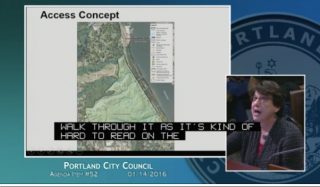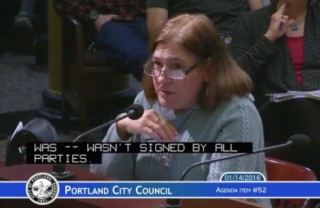In the past decade there have been a handful of key moments on Portland’s mountain biking timeline.
Yesterday’s city council meeting was one of the biggest.
The River View Natural Area Management Plan passed 4-0 (Commissioner Dan Saltzman was absent) with an amendment that keeps open the possibility of bicycle access in the future. On paper, that’s far from what many off-road cycling advocates wanted. In repeated testimony at the hearing, they urged council to delay the plan’s passage until after the city completes its Off-road Cycling Master Plan.
Their concerns were that if it the plan gets adopted it would set in stone barriers to bike access: a limiting trail alignment and an “interim prohibited” status for cycling.
Thanks to the Northwest Trail Alliance, who reached out to Mayor Charlie Hales and other commissioners to make their case prior the meeting, both Hales and Commissioner Steve Novick arrived on Thursday sharing their concerns about moving the plan forward.
The plan was ultimately adopted; but along with it came perhaps the most consequential political progress mountain biking has made in Portland in the last 25 years. Since bikes were relegated to wide fire access roads in Forest Park back in the 1990s, mountain bike advocates have always been on the outside looking in. Now it seems that the Northwest Trail Alliance and their supporters have finally broken through the dirt ceiling.
“Off-road bicyclists in this room have our attention.”
— Commissioner Steve Novick
All four of the commissioners present yesterday, including Mayor Charlie Hales, sang a different version of praise for mountain biking. Hales and Commissioner Steve Novick were both genuinely disturbed by how cycling and its advocates were treated during the River View public process and they asked tough questions of the city staff who were in charge of it. Novick and Hales doggedly probed city staff to make sure there were clear, on-the-record statements that cycling deserves its fair place in all future discussions of access and trail design at River View.
Parks Commissioner Amanda Fritz was first to support Novick’s amendment about re-opening the River View plan once the Off-road Cycling Master Plan is completed and Bureau of Environmental Services Commissioner Nick Fish repeatedly said mountain biking was a “legitimate” use of city land.
Most importantly, bike advocates got an unequivocal promise that if the Off-road Cycling Master Plan deems cycling suitable at River View, it will have the power to supersede the River View Management Plan.
The hearing started like many plan adoption hearings in Portland do. Commissioners and staff praised the process and tried to paint a picture of cooperation and kumbayah. Bureau of Environmental Services Director Michael Jordan said the plan was developed with a, “Thorough and very open process,” and that, “Everybody should be happy having worked on it together.” Jordan’s colleague at Portland Parks and Recreation Mike Abbaté added, “We should all be proud of the River View plan.”
“We helped remove invasives but we made no mention of bikes. It wasn’t about bikes, it was just the right thing to do for that space.”
— Erik Tonkin, owner of Sellwood Cycle Repair
“Should” is the key word here.
Mountain bike supporters were squirming in their seats. The truth is that this process has been very controversial and contentious.
City staff and Commissioners Fritz and Fish painted a picture of River View as an ecological wonder. They called it a “jewel” and described it as the most ecologically important piece of land in the region.
The truth is not everyone agrees with its ecological significance and prior to its purchase in 2011, River View was all but forgotten by the city for decades as it became overrun with invasive ivy, camping, parties, trash, and rampant illegal trail use.
After commissioners and city staff set the table, people who were involved with the project advisory committee where invited to testify. This is where things got interesting.
Nearby resident and committee member Chris Sautter testified that he didn’t support the plan in its current form. Sautter said he jumped at the chance to be involved with this project and had high hopes that cycling would finally be given a fair shake. “Then the meetings,” he said. “I was notified bikes would be excluded from plan. It was a shock to me… this wasn’t the direction the [committee] was headed.”
When it was time for public testimony, council heard mostly from people who supported bike access. As the testimony flowed in, the facade of cooperation and consensus the city had propped up came crumbling down.
Advertisement
Noted conservationist Mike Houck of the Urban Greenspaces Institute said he could envision bikes in River View someday. So did Bob Sallinger from Portland Audubon. “We think it’s unfortunate we didn’t get to the biking issue,” he said. “Audubon believes biking would be appropriate here.” (Both Houck and Sallinger however, want to keep the current trail alignment which is only one loop trail with no access into the interior of the parcel.)
Sellwood Cycles owner Erik Tonkin said he’s concerned about how the plan “locks-in” a trail alignment that might not suit cycling later on. He also pointed out the irony of seeing a photo of himself in Parks’ presentation on the plan. “On Emily’s [Roth, Parks project manager] last slide saying ‘thank you’ is a photo of the very last work party at River View, a party co-sponsored by my bike shop and staffed by my staff. We helped remove invasives but we made no mention of bikes. It wasn’t about bikes, it was just the right thing to do for that space.”
Testifier Tristan Jones said Council shouldn’t support the plan because it was developed amid “a legacy of distrust” and that biking was, “systematically excluded from the public process.” “To exclude and silence one constituent group is unethical,” he added.
And then the NW Trail Alliance got their chance. The group’s Advocacy Chair Andrew Jansky opened with, “We’re living the same nightmare year after year.” He said this council had made good strides already and has the chance to be the first one in nearly three decades to shake off the “negative legacy” of mountain bike debates and “take a progressive look forward.”
Charlie Sponsel, the advisory committee member who led a rally at River View back in March, said it would be “totally illogical” to approve the plan until after Portland adopted a set of best practices for mountain biking (which is one of the goals of the Off-road Cycling Master Plan).
The last person to testify was perhaps the most powerful. Kathleen Walker spent 30 years with the National Forest Service and the last 23 she was a recreation manager for the Mt. Hood National Forest. She was unknown to many people in the room and I think she surprised everyone with her testimony. “I have 30 years of experience managing national forest lands,” she said. “And you can’t set this area aside like a book so nobody can touch. You need users to help you maintain it.” Walker urged council to not pass the plan and embrace biking access.
After the testimony there was no sign from Mayor Hales that he would expedite a vote. He was clearly not happy with what he’d heard. “It’s distressing we’ve gotten to this impasse,” he said.
At this point, Hales was casting about, looking for clarity and direction. He was leaning toward delaying the plan. He called parks staff back up to the table. “Where do we go from here Mike?” he asked Parks director Mike Abbaté?
“We know there’s huge demand,” Abbaté said. “It’s [biking is] a recreation need we’re not meeting.”
Hales was still trying to gain clarity on the trail alignment issue. He heard from bike experts and the public that concerns remained about the trail in the River View management plan. Hales wanted to know whether or not – and/or how much — that trail could be moved if cycling were to be accomodated in the future. Parks Project Manager Emily Roth said it’s just a concept plan and a general corridor, and that the trail could be moved 5-10 feet if necessary.
“If biking is allowed in River View,” Roth told Hales, “We’ll go back out to the community. We’ll have that conversation about what it will look like, how it will be managed…”
“So why not do that before completing this plan?” Hales countered.
“Because we were instructed to not have that conversation,” Roth said.
Hales then asked Commissioner Fritz a series of questions about where a bike trail could go. Still not satisfied, Commissioner Novick continued Hales’ probing questions. Then Commissioner Fish, perhaps sensing things were going south, jumped in.
“There are always competing values we have to reconcile,” Fish said. Then he assured Novick by adding, “Council has final say.”
Fish has an interesting place in this because of his past role in the Forest Park disaster (“I still have scars to prove it when we worked through a similar discussion in Forest Park that didn’t go as far as I’d hoped,” he said yesterday). Since then he’s lost the Parks portfolio to Fritz; but now he’s in charge of the Environmental Services Bureau which has thrust him into the bike access issue yet again.
“We need to accomodate this legitimate recreational use in a big city with big shoulders and lots of land. And we’ll do that.”
— Charlie Hales, Mayor of Portland
On Thursday Fish tried to walk a fine line between support for off-road cycling in general and his legal duties to minimize recreation access in River View specifically.
“The question is,” Fish said as he tried to re-orient the bike access conversation Novick was having. “How can we harmonize a perfectly legitimate claim for access? The question isn’t whether we’re pro or con, that’s an ideological construct that I reject… I would maintain, particularly as someone careful of how we use ratepayer dollars; that when harmonizing any use in a sensitive natural area, those lines have to be carefully drawn.”
Again Hales questioned Parks project manager Roth: “So, there could be additional sections of trail added later?” he asked. “It could be considered,” Roth replied, “As long as the natural resource goals are maintained.”
Hales then reminded Parks Director Abbaté that Portland is supposed to “have big shoulders” when it comes to accomodating users. “We accomodate a bewildering variety of recreational uses,” he said. “I trust that you… meet all those different needs?”
“I do,” Abbaté said.
At this point, Novick was still on the fence. So much so that he looked for support from Hales. “I’m very concerned about voting today. Mayor, where do you stand?”
“I was originally interested in delaying the plan,” Hales replied, “But given this discussion and your amendment I can vote today… if you’re willing to proeced to a vote.”
“With considerable hesitation,” Novick answered. “Yes.”
When it came time to vote, Novick voted to support the plan even though he remains troubled by what he heard about the process to develop it. “And you have my assurances,” he told the crowd (about 50 of whom were cycling supporters), “My amendment is not window dressing. Off-road bicyclists in this room have our attention. I enourage your continued advocacy.”
Then Hales expressed heartfelt regret for how cycling advocates were treated in the process. “I’m really sorry that there’s some mistrust in this room,” he said. “And I’m sorry that there’s been either a real or perceived exclusion of legitimate interests at the table… You’re right. We need to accomodate this legitimate recreational use in a big city with big shoulders and lots of land. And we’ll do that.”
— Jonathan Maus, (503) 706-8804 – jonathan@bikeportland.org





